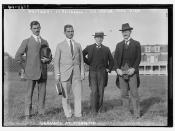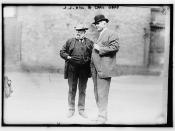AbstractIn this paper I will discuss the theorist Carl Rogers, his contributions to the field of psychology, occurrences during his lifetime that have influenced his perspectives and how his theories can be applied.
"Virtually all therapists today are "Rogerian" in style, no matter what their clinical or theoretical orientation, or what they think of Carl Rogers. Does any clinician not subscribe, at least in part, to the holy trinity of Rogers's psychotherapeutic method: "unconditional positive regard"â¦â¦?"(Psychotherapy Networker Magazine, 2007)Carl Rogers was a prominent psychotherapist and consultant, and one of the top respected psychologists in the country. In 1982, a copy of Psychology Networker was published and in the same year, American Psychologist had surveyed members of the American Psychological Association to find out which orientations they followed and which psychotherapists in the field were the most influential.
It seemed fitting to re-examine these questions on the 25th anniversary of the magazine, and see how therapy has changed and developed over time.
"The shocking find was that in both surveys the most significant psychotherapist was Carl Rogers." (Psychotherapy Networker Magazine, 2007)Rogers, born in Chicago, was a middle child with 5 brothers and one sister. His parents were traditional, conservative Protestants who had daily prayers with the family and attempted to keep Carl and his siblings away from the evil of the world. Carl kept to himself and had very few acquaintances. He was a susceptible to his family constantly mocking him. The Rogers family never encouraged the expression of their feelings, so Carl's thoughts and emotions often were articulated in his papers at school and in games he played with friends.
When Carl became a teenager his family moved to Illinois. There, Carl grew to love the natural world and obtained knowledge of logical methods. He and...


